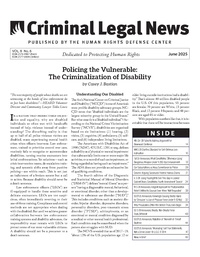by Casey J. Bastian
“The vast majority of people whose deaths we are witnessing at the hands of law enforcement do in fact have disabilities”—HEARD Volunteer Director and Community Lawyer Talila Lewis
In a nation that prides itself on justice and equality, why are disabled individuals so …
The integrity of Los Angeles County’s justice system is under fire following the news that potentially defective DNA test kits were used for months in thousands of criminal cases.
Despite being notified in August 2024 that its kits were “prone to intermittently poor performance,” the Los Angeles County …
The United States Court of Appeals for the Fourth Circuit held that the U.S. District Court for the District of South Carolina committed procedural error by failing to address the defendant’s arguments for a lower sentence and failing to provide an individualized explanation for the sentence it imposed because …
by Jo Ellen Nott
Maryland Governor Wes Moore signed a suite of reform bills into law on April 22, 2025, marking a victory for incarcerated individuals, the formerly incarcerated, and advocates who have worked tirelessly for these changes for years.
The newly enacted legislation addresses critical issues …
The Supreme Court of Minnesota clarified the standard for determining whether a defendant is entitled to a jury instruction on self-defense and defense of others. Applying the clarified standard, the Court held that the district court erred by not providing the requested jury instructions and that the defendant is …
The United States Court of Appeals for the First Circuit held that the U.S. District Court for the District of Puerto Rico improperly applied the four-level sentencing enhancement for “otherwise using” a dangerous weapon under U.S. Sentencing Guidelines (“Guidelines”) § 2B3.1(a) to the defendant’s sentence for carjacking because the …
by David Kim
Police records obtained by WIRED reveal that the rise of internet-connected car features, spurred by automakers’ subscription models, is increasing drivers’ vulnerability to government surveillance. These documents expose how law enforcement agencies exploit the data generated by modern vehicles, often without public knowledge or meaningful …
This column is a follow-up to my original column published in the March 2021 issue of Criminal Legal News titled “Raising Successful Federal Habeas Corpus Claims.” In that first piece, I explained how to identify valid claims for federal habeas relief, claims that have the potential to justify relief. …
by David Kim
Ohio’s death penalty system, which has consumed over a billion dollars, delivers neither justice nor closure, according to a damning report by Ohioans to Stop Executions. The system—marked by exorbitant costs, prolonged delays, and a troubling history of wrongful convictions—fails victims’ families, prison staff, and …
The Supreme Court of Illinois reversed the Appellate Court’s denial of the defendant’s suppression motion, holding that contraband discovered by police inside a kitchen cabinet that was slightly ajar but secured with a chain and padlock should have been suppressed because police used a flashlight to peer into the …
Illinois maintains a digital public shaming website called the Murderer and Violent Offender Against Youth Database, which is mandated under the provisions of Illinois Compiled Statutes 730 ILCS 154/85 (a) and (b). Supporters of the registry often claim that it enhances public safety, but not everybody agrees that it …
The United States Court of Appeals for the Fourth Circuit held that the U.S. District Court for the Southern District of West Virginia abused its discretion by failing to address the defendant’s non-frivolous argument for a downward variance.
Tytus Lamaar Shields was importing drugs for distribution in Parkersburg, …
The Supreme Court of Rhode Island quashed the orders of the Superior Court that summarily dismissed an indigent first-time applicant’s request for postconviction relief because the Superior Court failed to determine whether the applicant, who did not specifically ask for the appointment of counsel, intended to proceed pro se …
The Supreme Court of the United States held that knowingly or intentionally causing bodily injury or death by failing to take action—that is, by omission—uses physical force for purposes of the elements clause of § 924(c).
Background
Salvatore Delligatti was an associate of the Genovese crime family …
This article was originally published by the Cato Institute at cato.org. It has been reprinted with permission.
The Bill of Rights dedicates more words to the resolution of criminal charges than any other subject, establishing a criminal justice system in which defendants are afforded rigorous protections …
by David Kim
At United States border crossings, Customs and Border Protection (“CBP”) wants to photograph every vehicle occupant, from drivers to back-seat passengers, using real-time facial recognition to match images with travel documents. A recent federal notice details this plan, which is reportedly intended to enhance security …
In a positive step advancing fair-chance policy for formerly incarcerated individuals, Virginia and Utah both signed policies into law in March 2025 that will help dismantle barriers faced by people with criminal records as they reenter the world of work.
The National Council of State Legislatures (“NCSL”) has …
The Supreme Court of South Carolina held that the defendant was entitled to a self-defense jury instruction where he presented some evidence upon which a jury could reasonably conclude that he acted in self-defense and that it was error for the trial court to refuse to provide the requested …
by James Mills
When law enforcement wants to screen a person for drug use, they usually must collect some kind of invasive physical sample from the suspect. Urine, blood, and hair are all common choices. Now drug use may soon be detectable from fingerprints alone.
For years, …
Sitting en banc, the Supreme Court of Mississippi reversed both the trial court and Court of Appeals’ decisions that the State’s multiple violations of the defendant’s rights under the United States Constitution as well as the Mississippi Rules of Evidence and multiple instances of prosecutorial misconduct did not deprive …
The Supreme Court of the United States held that courts may not apply the “moment-of-threat” doctrine when evaluating the reasonableness of police officers’ use of deadly force involving claims of excessive force in violation of the Fourth Amendment because the doctrine improperly narrows the requisite inquiry into the “totality …
Forensic science has traditionally relied on DNA evidence from sperm to identify suspects in sexual assault cases. However, when no sperm is present—such as when a perpetrator uses a condom—these methods are often ineffective.
New research published in iScience in February 2025 suggests a novel approach to using …
Georgia has joined a growing number of states that prohibit the execution of people with intellectual disabilities after Gov. Brian Kemp signed a bill into law on May 12, 2025, establishing clearer legal protections for such defendants in capital cases.
Nearly Impossible Standard Eliminated
For decades, Georgia …
Resolving a split between the United States Courts of Appeals for the Sixth Circuit and Seventh Circuit, the Supreme Court of the United States held that 18 U.S.C. § 1014 criminalizes only “false” statements, not ones that are “misleading” but true, i.e., not false.
Background
Patrick Thompson …
Loaded on
May 15, 2025
published in Criminal Legal News
June, 2025, page 49
Alabama: On March 31, 2025, in State of Alabama v. Mac Marquette, Morgan County Circuit Judge Charles Elliott denied former Decatur Police Department officer Marquette’s motion for self-defense immunity in the fatal shooting of Steve Perkins. According to the Associate Press, the denial depended legally on whether Marquette acted …






